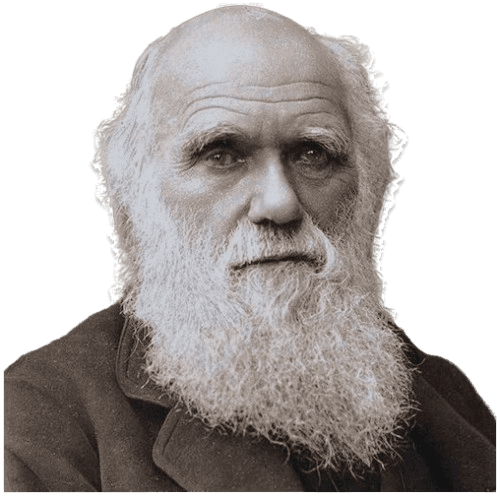Life and achievements
Early life
Charles Robert Darwin was born on February 12, 1809, in Shrewsbury, England, into a wealthy family. From a young age, he displayed a keen interest in nature, though he showed little enthusiasm for formal education. He preferred to spend his time hunting for stones, collecting beetles, and exploring the natural world.
Darwin’s father sent him to the University of Edinburgh to study medicine, but Darwin found the subject uninteresting and was repelled by the sight of surgery. Recognizing his son’s lack of passion for medicine, Darwin’s father later sent him to the University of Cambridge to study theology, hoping he would become a clergyman. However, at Cambridge, Darwin was more drawn to the study of plants and animals than to theology, finding inspiration in his mentor, Professor John Stevens Henslow, and geologist Adam Sedgwick.
Darwin’s passion for natural history grew during his time at Cambridge. After completing his studies, he was presented with a life-changing opportunity: to serve as the naturalist aboard the HMS Beagle, a British naval vessel set to embark on a five-year voyage around the world. This journey would prove to be a turning point in Darwin’s life and the foundation for his revolutionary ideas on evolution.
Legacy
Charles Darwin’s theory of evolution by natural selection is one of the most significant scientific ideas ever proposed. His work fundamentally changed our understanding of life on Earth, explaining how species adapt to their environments over time through the gradual accumulation of beneficial traits.
Darwin’s ideas have had a tremendous impact on many fields beyond biology, including genetics, ecology, and anthropology. His theory of evolution has reshaped how we think about life, the interconnectedness of species, and the complex processes that drive change over millions of years.
Beyond his scientific contributions, Darwin’s work has influenced how we approach the study of nature and the scientific method itself. He taught us to observe the natural world carefully, think critically, and seek evidence-based explanations for the phenomena we encounter. His legacy continues to inspire scientists to ask questions, conduct experiments, and pursue knowledge with curiosity and rigor.
Darwin’s ideas also sparked important debates about humanity’s place in the natural world and our responsibilities toward other living beings. His work challenged traditional views on ethics, morality, and the relationship between humans and the environment, leading to new ways of thinking about conservation, animal rights, and the stewardship of our planet.
Despite facing criticism and controversy during his lifetime, Darwin’s theories have stood the test of time. Today, they are recognized as foundational to our understanding of biology and continue to shape scientific research and thought.
Join Confinity today to protect your digital privacy and take control of your online presence. Signup Now
Learn how historical figures leave behind lasting legacies that shape culture. →
Milestone moments
Dec 27, 1831
Embarking on the HMS Beagle
Charles Darwin as a young man, on the twenty-seventh of December in 1831, boarded the HMS Beagle, a British naval vessel in which he was to serve as the naturalist of the ship. Although it only started as an earthly tour that would take approximately five years, this voyage turned out to be one of the most significant experiences in scientific history based on the observations made by Darwin.
Sep 15, 1835
Observations in the Galápagos Islands
The young naturalist was aboard the HMS Beagle when one of the most defining threads of his life started – the visit to Galápagos that happened on September 15, 1835. Here, Darwin was able to witness an incredible number of different forms of species, most of which were endemic to the area. Among them were the famous Galápagos finches already spoken about – all of them distinct from each other and with their own special adaptation to the particular area of the islands. These observations, though interesting on their own, would later form the foundation of Darwin's theory of evolution by natural selection.
Nov 24, 1859
Formulating the Theory of Evolution
It took Charles Darwin over twenty years of contemplation and diligent study to finally share his thoughts, which helped to change the whole world: “On the Origin of Species” was first issued on November 24, 1859. This revolutionary work showcased significant arguments regarding evolution by means of natural selection. He said that species change with time due to factors like natural selection where there are those individuals with particular characteristics that make them to survive and reproduce than others, thus passing down their characteristics to their progeny.
This revolutionary theory dominated the field of biology, offering a unity that scientists could only have dreamed of, and it fundamentally changed the world of science.
Jun 18, 1858
Debate with Alfred Russel Wallace
It was in the following June that a letter reached Darwin from another naturalist, Alfred Russel Wallace, proposing his theory of natural selection. Realizing the importance of Wallace’s insights, Darwin rushed to put his notes into print, and the resulting clash published simultaneously the HMS Beagle reports to the Linnean Society of London. While not nearly as raucous at the time as the Scopes trial in the United States, this event in England was pivotal in the movement of science and definitively placed Darwin at its forefront.
